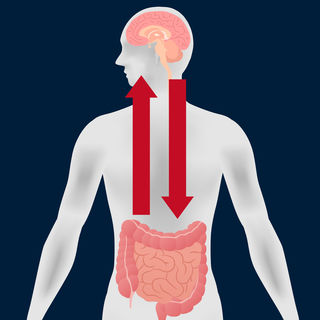Diet
Excess Dietary Salt Can Impair Cognition via Gut-Brain Axis
A high-salt diet is linked to reduced cerebral blood flow and dementia in mice.
Posted January 19, 2018

Consuming too much salt suppresses cerebral blood flow and can lead to cognitive dysfunction via the gut-brain axis, according to a new study on mice. This is the first time scientists have identified a gut-brain connection linking the triad of excess dietary salt, reduced blood flow to the brain, and cognitive impairment. The paper by researchers at Weill Cornell Medicine, "Dietary Salt Promotes Neurovascular and Cognitive Dysfunction Through a Gut-Initiated TH17 Response," was published January 15 in the journal Nature Neuroscience.
Doctors recommend consuming less than 2,400 mg of dietary salt per day. Alarmingly, 90 percent of American adults consume much higher amounts of sodium on a daily basis. In fact, the average American consumes over 3,400 mg of sodium per day. To reduce your salt intake, start by paying attention to nutrition fact labels and educate yourself about how much sodium is in the foods and beverages you consume.
For this study, mice were fed a diet consisting of either 4 percent or 8 percent salt. This represented an 8- or 16-fold increase in sodium intake compared to a typical mouse diet. After eight weeks of consuming a high-salt diet, the mice were all given MRI brain scans. The mice eating excessive salt showed a 20 to 30 percent reduction in blood flow to the brain compared to mice consuming typical amounts of sodium.
Notably, the decrease in cerebral blood flow to the cortex and hippocampus was linked to mouse-like dementia symptoms. This included difficulty navigating a maze, recognizing familiar objects, and building a proper nest. The good news: When mice returned to a normal diet with less salt, both blood flow to the brain and cognitive function improved. This suggests that the detrimental effects of a high salt diet are reversible.
"The brain is extremely dependent on getting the right amount of blood at the right time. If blood flow isn't matched to what the brain needs, things go wrong," senior author Costantino Iadecola, director of the Feil Family Brain and Mind Research Institute (BMRI), said in a statement.
Iadecola and colleagues also discovered that mice who were consuming a high-salt diet developed an adaptive immune response in their guts. This response was marked by an uptick in the activity of immune cells that regulate inflammatory responses. More specifically, excessive dietary salt caused an expansion of TH17 cells in the small intestine, which resulted in a significant increase of plasma interleukin-17 (IL-17).

As the authors write in the study abstract: “The findings reveal a new gut-brain axis linking dietary habits to cognitive impairment through a gut-initiated adaptive immune response compromising brain function via circulating IL-17. Thus, the TH17 cell–IL-17 pathway is a putative target to counter the deleterious brain effects induced by dietary salt and other diseases associated with TH17 polarization.”
This research dovetails with another study from 2017, “Gut to Brain Dysbiosis: Mechanisms Linking Western Diet Consumption, the Microbiome, and Cognitive Impairment.” A growing body of evidence has found a link between the gut microbiome and cognitive function that is mediated via the gut-brain axis. (For more see, "The Microbiome-Gut-Brain Axis Relies on Your Vagus Nerve.")
The latest findings from Iadecola lab at Weill Cornell Medicine add valuable new evidence to help us better understand how the gut-brain axis influences cognition.
References
Giuseppe Faraco, David Brea, Lidia Garcia-Bonilla, Gang Wang, Gianfranco Racchumi, Haejoo Chang, Izaskun Buendia, Monica M. Santisteban, Steven G. Segarra, Kenzo Koizumi, Yukio Sugiyama, Michelle Murphy, Henning Voss, Joseph Anrather, Costantino Iadecola. "Dietary Salt Promotes Neurovascular and Cognitive Dysfunction Through a Gut-Initiated TH17 Response." Nature Neuroscience (Published online: January 15, 2018) DOI: 10.1038/s41593-017-0059-z
Emily E. Noble, Ted M. Hsu, and Scott E. Kanoski. "Gut to Brain Dysbiosis: Mechanisms Linking Western Diet Consumption, the Microbiome, and Cognitive Impairment." Frontiers in Behavioral Neuroscience (Published online: January 30, 2017) DOI: 10.3389/fnbeh.2017.00009
Valentin A. Pavlov and Kevin J. Tracey. "The Vagus Nerve and the Inflammatory Reflex—Linking Immunity and Metabolism." Nature Reviews Endocrinology (2012) DOI: 10.1038/nrendo.2012.189


